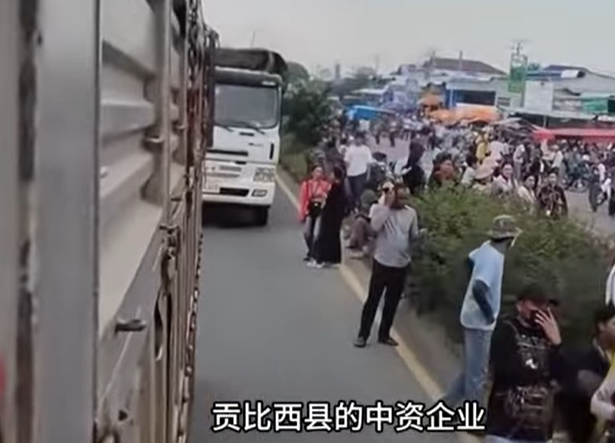https://www.youtube.com/watch?v=u0KltcnJzxk
「柬埔寨中资制衣厂5000工人连日罢工,抗议公司乱罚款及削减福利(2025.10.2-3)」10 月 2 日至 3 日,位于柬埔寨实居省贡比西县的中资企业 TARAL制衣厂爆发罢工。数千名工人连续两天停工并一度封锁国道 3 号,抗议工厂近期实施的惩罚性管理制度及削减午餐补贴等措施。
这起事件成为柬埔寨近期规模最大的制造业劳资纠纷之一,吸引了政府、媒体及公众的广泛关注。据多家柬埔寨媒体报道,TARAL 工厂的新管理层上任后,陆续推行多项新规,其中包括:工人迟到 1 分钟即罚款 10 美元;取消每日午餐补贴;提高产量标准、削减绩效奖金;禁止携带药品和饮用水入厂等。这些苛刻的规定立刻引发了工人的普遍不满,认为其违反了柬埔寨《劳动法》的公平劳动原则。
罢工始于于 10 月 2 日早晨。当日,部分工人拒绝进入厂区,并聚集在厂门前示威。10 月 3 日,冲突进一步升级。因公司宣布将扣除参与罢工工人 10 月 2 日当天的工资,约 5,000 名工人再次集体罢工,并封锁国道 3 号交通,要求公司撤回决定并恢复午餐补贴。
现场视频显示,数以千计的工人聚集在道路中央,要求公平对待和尊重工人权利,封路持续数小时,导致周边交通严重受阻。当日,实居省劳工局局长带领调解小组赶赴现场,与公司代表和工人代表展开谈判。据悉,工厂已同意:不再扣除 10 月 2 日工人的工资并重新审议迟到罚款制度;公司还承诺与工人代表就午餐补贴和产量标准继续谈判。截至 10 月 4 日,大部分工人已返回岗位,但部分诉求尚未得到完全解决。
TARAL制衣厂位于柬埔寨纺织产业重镇实居省,主要为欧美品牌代工。该厂被多家媒体称为“中资背景企业”,但其具体股权结构与母公司信息尚未公开。
柬埔寨是东南亚重要的服装出口国,拥有超过 800 家制衣厂,雇佣工人逾 70 万人,其中相当比例的工厂由中资或台资企业投资。近年来,随着订单压力增大和成本上升,部分企业试图通过严格管理、提高产量来维持利润,导致劳资矛盾频发。
“5,000 Workers at Chinese-Invested Garment Factory in Cambodia Strike for Consecutive Days to Protest Fines and Welfare Cuts (Oct 2–3, 2025)”
From October 2 to 3, a large-scale strike broke out at TARAL Garment Factory, a Chinese-invested enterprise located in Kong Pisei District, Kampong Speu Province, Cambodia. Thousands of workers stopped work for two consecutive days and briefly blocked National Road No. 3, protesting the company’s recent punitive management measures and the cutting of lunch allowances.
This incident became one of the largest labor disputes in Cambodia’s manufacturing sector in recent months, drawing widespread attention from the government, media, and the public. According to multiple Cambodian news outlets, after a new management team took over at TARAL, the factory introduced several controversial new rules, including:
•a US$10 fine for being one minute late,
•cancellation of daily lunch subsidies,
•higher production quotas and reduced performance bonuses,
•a ban on bringing medicine or drinking water into the factory.
These harsh measures quickly sparked strong dissatisfaction among workers, who said the policies violated the principles of fair labor under Cambodia’s Labor Law.
The strike began on the morning of October 2. That day, some workers refused to enter the factory and gathered in protest outside the gate. On October 3, the situation escalated after the company announced that it would deduct one day’s wages from workers who joined the strike on October 2. Around 5,000 workers walked off the job again and blocked traffic on National Road No. 3, demanding the company withdraw the decision and reinstate the lunch allowance.
Videos from the scene showed thousands of workers occupying the road, chanting for fair treatment and respect for workers’ rights. The road blockade lasted for several hours, causing severe traffic disruption in the area. Later that day, the director of the Kampong Speu Provincial Labor Department led a mediation team to the site to negotiate between company and worker representatives.
Reportedly, the factory agreed not to deduct the October 2 wages and to review the lateness penalty policy. The company also promised to continue negotiations with worker representatives regarding the lunch subsidy and production targets. As of October 4, most workers had returned to work, though some of their demands remained unresolved.
TARAL Garment Factory, located in Cambodia’s garment manufacturing hub of Kampong Speu Province, mainly produces for European and American brands. The factory has been widely described by media as a Chinese-invested enterprise, though its specific ownership structure and parent company information have not been publicly disclosed.
Cambodia is a major garment exporter in Southeast Asia, with over 800 factories employing more than 700,000 workers, a significant proportion of which are Chinese- or Taiwanese-invested. In recent years, as global orders tightened and production costs rose, some companies have attempted to maintain profits through stricter management and higher output, leading to more frequent labor disputes.


